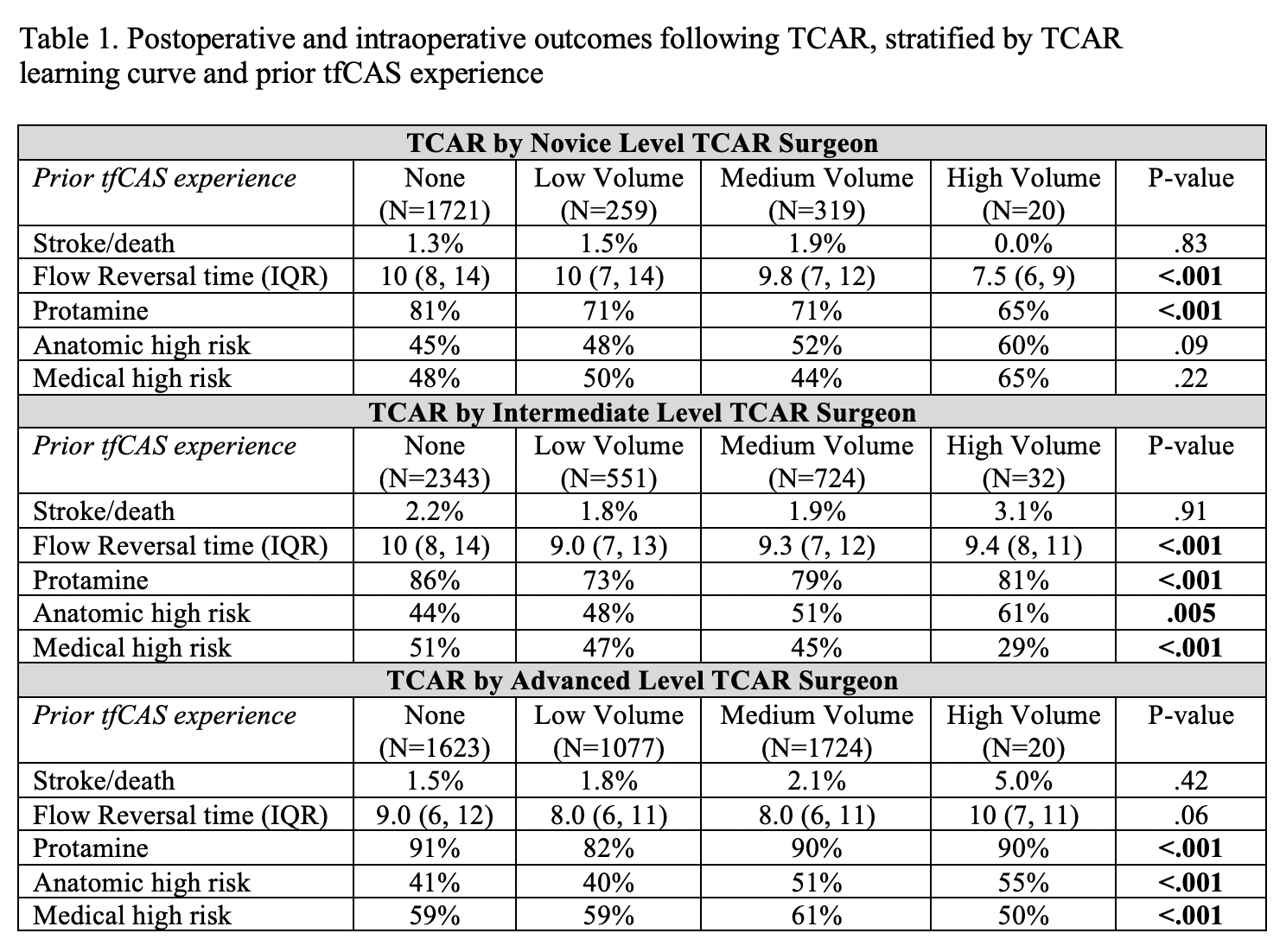The Learning Curve For Transcarotid Artery Revascularization Is Not Affected By Prior Transfemoral Carotid Artery Stenting Experience
Priya Patel, MD1, Christina Marcaccio, MD MPH2, Vinamr Rastogi, MD2, Grace Wang, MD3, Brian Nolan, MD4, Raghu Motanganahalli, MD5, Mahmoud Malas, MD6, Vikram Kashyap, MD7, Marc Schermerhorn, MD2.
1Rutgers Robert Wood Johnson Medical School, New Brunswick, NJ, USA, 2Beth Israel Deaconess Medical Center, Boston, MA, USA, 3University of Pennsylvania, Philadelphia, PA, USA, 4University of Maine, Portland, ME, USA, 5University of Indiana, Indianapolis, IN, USA, 6University of Southern California, San Diego, CA, USA, 7Univresity Hospital, Cleveland, OH, USA.
OBJECTIVES: Prior studies have demonstrated a learning curve associated with the use of TCAR, however prior tfCAS experience was not factored into these analyses. Therefore, our object was to assess the effect of prior tfCAS experience on the TCAR learning curve.
METHODS: We identified all TCAR procedures in the VQI TCAR Surveillance Project (2016-2021) performed at centers that also performed tfCAS prior to the adoption of TCAR. Repairs were first stratified by TCAR learning curve, which was defined by total TCAR cases: novice (1-5), intermediate (6-20), or advanced (>20). After stratification by TCAR learning curve, outcomes were then compared by annual tfCAS volume. Annual tfCAS volume was defined as low (1-3 cases/year), medium (4-23 cases/year), or high (>23 cases/year). TCARs performed by surgeons without any prior tfCAS experience were categorized separately.
RESULTS: Of 10,413 TCARs, 22% were performed at the novice TCAR experience level, 35% at the intermediate level, and 43% at the advanced level. Of all TCAR cases, 55% were performed by surgeons with no prior tfCAS experience. At the intermediate and advanced TCAR levels, surgeons with higher tfCAS experience were more likely to operate on patients considered anatomically high risk for carotid endarterectomy(Table1). Across all levels of TCAR experience, intraoperative protamine use was highest amongst surgeons with no prior tfCAS experience. Amongst novice TCAR surgeons, intraoperative protamine use decreased with increasing prior tfCAS experience (71% vs 65%). However, among intermediate and advanced level TCAR surgeons, intraoperative protamine use increased with increasing prior tfCAS experience (intermediate TCAR surgeon: 73% vs 81%; advanced TCAR surgeon: 82% vs 90%). Across all TCAR experience levels, there were no differences in in-hospital stroke/death based on prior tfCAS experience.
CONCLUSIONS: TCAR is a safe option for carotid artery revascularization, even when completed by novice-level TCAR providers, including those with no prior tfCAS experience. However, intraoperative protamine use was highest amongst surgeons with no prior tfCAS experience. Additionally, among novice TCAR surgeons, those with increasing tfCAS experience were less likely to use intraoperative protamine. These results may demonstrate behavioral practice patterns among surgeons with prior tfCAS experience despite the known benefits of intraoperative protamine use. 
Back to 2023 Display Posters
